NSB303 Partnerships in Health: Colorectal Cancer & Health Strategies
VerifiedAdded on 2023/03/31
|8
|1959
|99
Essay
AI Summary
This essay provides a critical analysis of individual, social, and environmental factors influencing health practices and strategies for promoting positive health behaviors in a 62-year-old man, John, suffering from colorectal cancer and undergoing chemotherapy. It explores discharge planning, self-management approaches, and the psychological, physical, and social issues faced by cancer survivors. The essay emphasizes effective communication and behavior change techniques to facilitate health education and promote a healthier lifestyle, highlighting the importance of addressing mental health, preventing recurrence, and fostering social support for patients and their families. Ultimately, the assignment aims to demonstrate survivorship care planning and improve understanding of the multifaceted challenges in managing colorectal cancer.

Running head: NURSING ASSIGNMENT
NURSING ASSIGNMENT
Name of the Student
Name of the University
Author note
NURSING ASSIGNMENT
Name of the Student
Name of the University
Author note
Paraphrase This Document
Need a fresh take? Get an instant paraphrase of this document with our AI Paraphraser
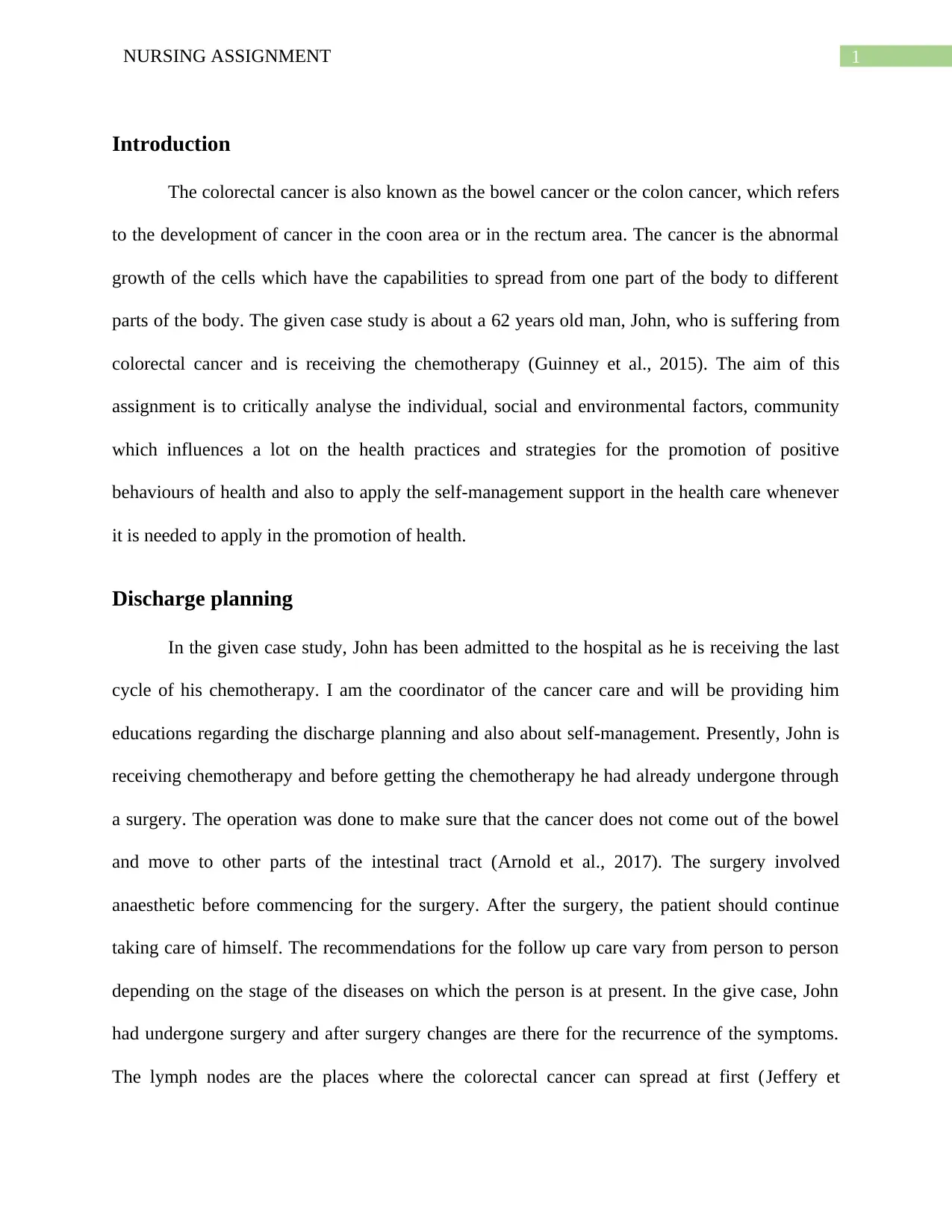
1NURSING ASSIGNMENT
Introduction
The colorectal cancer is also known as the bowel cancer or the colon cancer, which refers
to the development of cancer in the coon area or in the rectum area. The cancer is the abnormal
growth of the cells which have the capabilities to spread from one part of the body to different
parts of the body. The given case study is about a 62 years old man, John, who is suffering from
colorectal cancer and is receiving the chemotherapy (Guinney et al., 2015). The aim of this
assignment is to critically analyse the individual, social and environmental factors, community
which influences a lot on the health practices and strategies for the promotion of positive
behaviours of health and also to apply the self-management support in the health care whenever
it is needed to apply in the promotion of health.
Discharge planning
In the given case study, John has been admitted to the hospital as he is receiving the last
cycle of his chemotherapy. I am the coordinator of the cancer care and will be providing him
educations regarding the discharge planning and also about self-management. Presently, John is
receiving chemotherapy and before getting the chemotherapy he had already undergone through
a surgery. The operation was done to make sure that the cancer does not come out of the bowel
and move to other parts of the intestinal tract (Arnold et al., 2017). The surgery involved
anaesthetic before commencing for the surgery. After the surgery, the patient should continue
taking care of himself. The recommendations for the follow up care vary from person to person
depending on the stage of the diseases on which the person is at present. In the give case, John
had undergone surgery and after surgery changes are there for the recurrence of the symptoms.
The lymph nodes are the places where the colorectal cancer can spread at first (Jeffery et
Introduction
The colorectal cancer is also known as the bowel cancer or the colon cancer, which refers
to the development of cancer in the coon area or in the rectum area. The cancer is the abnormal
growth of the cells which have the capabilities to spread from one part of the body to different
parts of the body. The given case study is about a 62 years old man, John, who is suffering from
colorectal cancer and is receiving the chemotherapy (Guinney et al., 2015). The aim of this
assignment is to critically analyse the individual, social and environmental factors, community
which influences a lot on the health practices and strategies for the promotion of positive
behaviours of health and also to apply the self-management support in the health care whenever
it is needed to apply in the promotion of health.
Discharge planning
In the given case study, John has been admitted to the hospital as he is receiving the last
cycle of his chemotherapy. I am the coordinator of the cancer care and will be providing him
educations regarding the discharge planning and also about self-management. Presently, John is
receiving chemotherapy and before getting the chemotherapy he had already undergone through
a surgery. The operation was done to make sure that the cancer does not come out of the bowel
and move to other parts of the intestinal tract (Arnold et al., 2017). The surgery involved
anaesthetic before commencing for the surgery. After the surgery, the patient should continue
taking care of himself. The recommendations for the follow up care vary from person to person
depending on the stage of the diseases on which the person is at present. In the give case, John
had undergone surgery and after surgery changes are there for the recurrence of the symptoms.
The lymph nodes are the places where the colorectal cancer can spread at first (Jeffery et
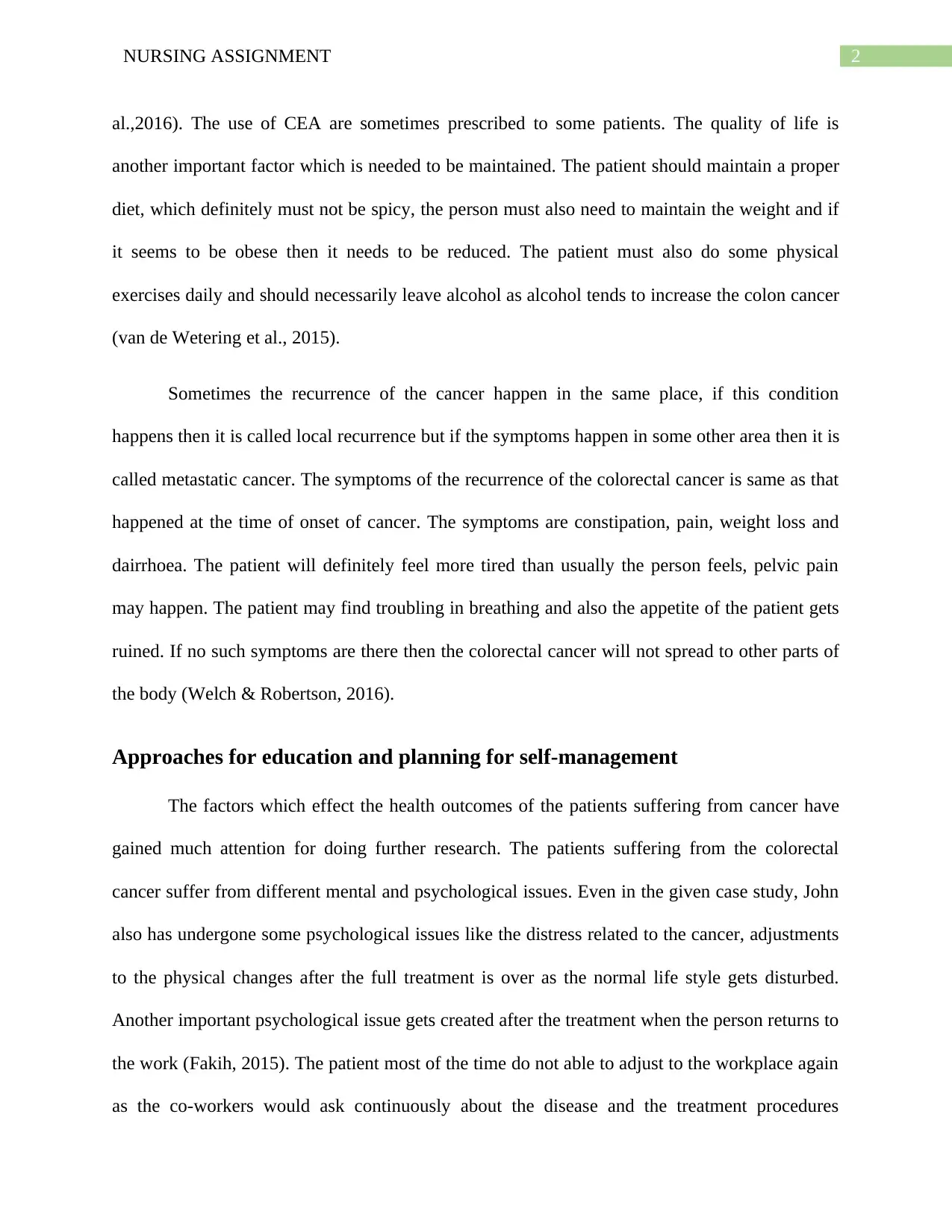
2NURSING ASSIGNMENT
al.,2016). The use of CEA are sometimes prescribed to some patients. The quality of life is
another important factor which is needed to be maintained. The patient should maintain a proper
diet, which definitely must not be spicy, the person must also need to maintain the weight and if
it seems to be obese then it needs to be reduced. The patient must also do some physical
exercises daily and should necessarily leave alcohol as alcohol tends to increase the colon cancer
(van de Wetering et al., 2015).
Sometimes the recurrence of the cancer happen in the same place, if this condition
happens then it is called local recurrence but if the symptoms happen in some other area then it is
called metastatic cancer. The symptoms of the recurrence of the colorectal cancer is same as that
happened at the time of onset of cancer. The symptoms are constipation, pain, weight loss and
dairrhoea. The patient will definitely feel more tired than usually the person feels, pelvic pain
may happen. The patient may find troubling in breathing and also the appetite of the patient gets
ruined. If no such symptoms are there then the colorectal cancer will not spread to other parts of
the body (Welch & Robertson, 2016).
Approaches for education and planning for self-management
The factors which effect the health outcomes of the patients suffering from cancer have
gained much attention for doing further research. The patients suffering from the colorectal
cancer suffer from different mental and psychological issues. Even in the given case study, John
also has undergone some psychological issues like the distress related to the cancer, adjustments
to the physical changes after the full treatment is over as the normal life style gets disturbed.
Another important psychological issue gets created after the treatment when the person returns to
the work (Fakih, 2015). The patient most of the time do not able to adjust to the workplace again
as the co-workers would ask continuously about the disease and the treatment procedures
al.,2016). The use of CEA are sometimes prescribed to some patients. The quality of life is
another important factor which is needed to be maintained. The patient should maintain a proper
diet, which definitely must not be spicy, the person must also need to maintain the weight and if
it seems to be obese then it needs to be reduced. The patient must also do some physical
exercises daily and should necessarily leave alcohol as alcohol tends to increase the colon cancer
(van de Wetering et al., 2015).
Sometimes the recurrence of the cancer happen in the same place, if this condition
happens then it is called local recurrence but if the symptoms happen in some other area then it is
called metastatic cancer. The symptoms of the recurrence of the colorectal cancer is same as that
happened at the time of onset of cancer. The symptoms are constipation, pain, weight loss and
dairrhoea. The patient will definitely feel more tired than usually the person feels, pelvic pain
may happen. The patient may find troubling in breathing and also the appetite of the patient gets
ruined. If no such symptoms are there then the colorectal cancer will not spread to other parts of
the body (Welch & Robertson, 2016).
Approaches for education and planning for self-management
The factors which effect the health outcomes of the patients suffering from cancer have
gained much attention for doing further research. The patients suffering from the colorectal
cancer suffer from different mental and psychological issues. Even in the given case study, John
also has undergone some psychological issues like the distress related to the cancer, adjustments
to the physical changes after the full treatment is over as the normal life style gets disturbed.
Another important psychological issue gets created after the treatment when the person returns to
the work (Fakih, 2015). The patient most of the time do not able to adjust to the workplace again
as the co-workers would ask continuously about the disease and the treatment procedures
⊘ This is a preview!⊘
Do you want full access?
Subscribe today to unlock all pages.

Trusted by 1+ million students worldwide
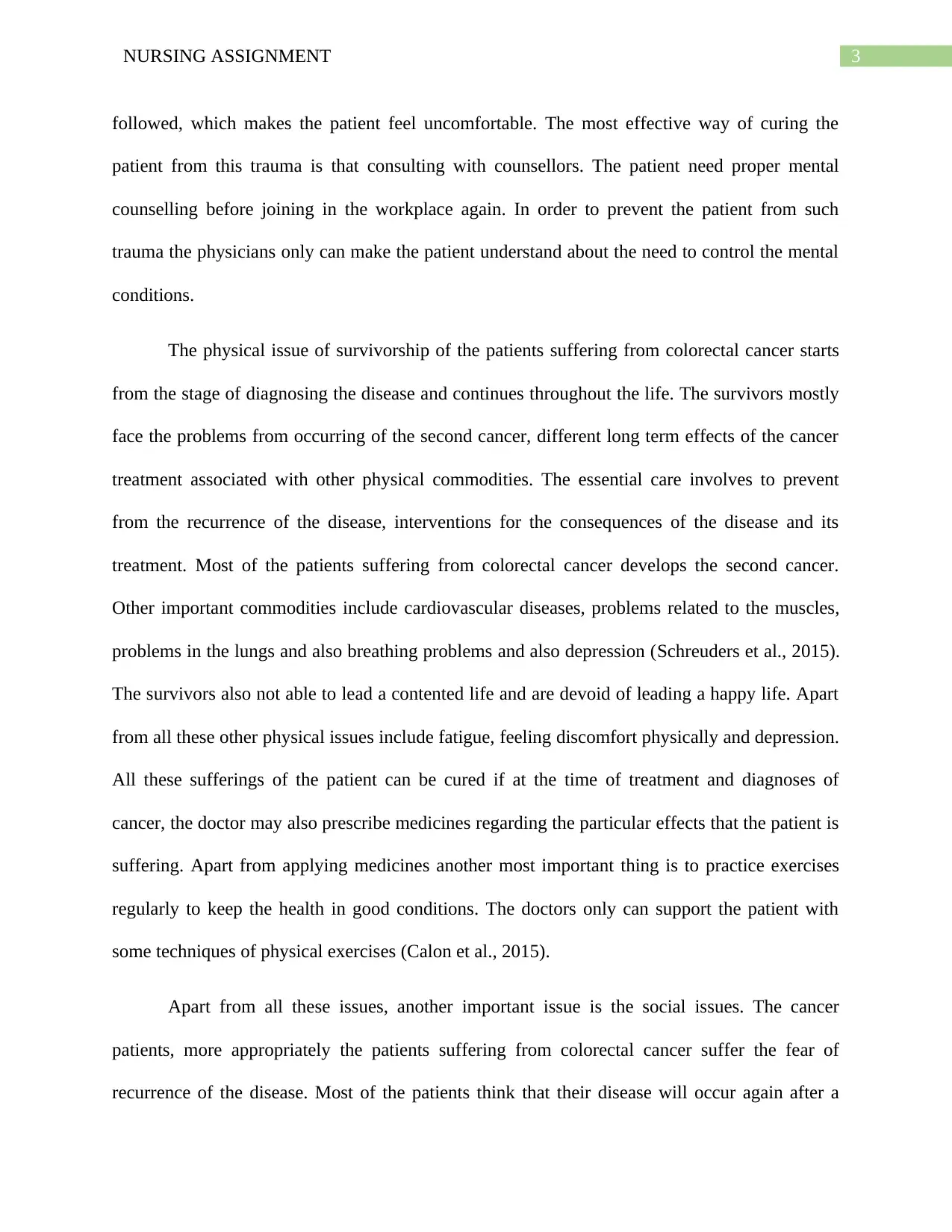
3NURSING ASSIGNMENT
followed, which makes the patient feel uncomfortable. The most effective way of curing the
patient from this trauma is that consulting with counsellors. The patient need proper mental
counselling before joining in the workplace again. In order to prevent the patient from such
trauma the physicians only can make the patient understand about the need to control the mental
conditions.
The physical issue of survivorship of the patients suffering from colorectal cancer starts
from the stage of diagnosing the disease and continues throughout the life. The survivors mostly
face the problems from occurring of the second cancer, different long term effects of the cancer
treatment associated with other physical commodities. The essential care involves to prevent
from the recurrence of the disease, interventions for the consequences of the disease and its
treatment. Most of the patients suffering from colorectal cancer develops the second cancer.
Other important commodities include cardiovascular diseases, problems related to the muscles,
problems in the lungs and also breathing problems and also depression (Schreuders et al., 2015).
The survivors also not able to lead a contented life and are devoid of leading a happy life. Apart
from all these other physical issues include fatigue, feeling discomfort physically and depression.
All these sufferings of the patient can be cured if at the time of treatment and diagnoses of
cancer, the doctor may also prescribe medicines regarding the particular effects that the patient is
suffering. Apart from applying medicines another most important thing is to practice exercises
regularly to keep the health in good conditions. The doctors only can support the patient with
some techniques of physical exercises (Calon et al., 2015).
Apart from all these issues, another important issue is the social issues. The cancer
patients, more appropriately the patients suffering from colorectal cancer suffer the fear of
recurrence of the disease. Most of the patients think that their disease will occur again after a
followed, which makes the patient feel uncomfortable. The most effective way of curing the
patient from this trauma is that consulting with counsellors. The patient need proper mental
counselling before joining in the workplace again. In order to prevent the patient from such
trauma the physicians only can make the patient understand about the need to control the mental
conditions.
The physical issue of survivorship of the patients suffering from colorectal cancer starts
from the stage of diagnosing the disease and continues throughout the life. The survivors mostly
face the problems from occurring of the second cancer, different long term effects of the cancer
treatment associated with other physical commodities. The essential care involves to prevent
from the recurrence of the disease, interventions for the consequences of the disease and its
treatment. Most of the patients suffering from colorectal cancer develops the second cancer.
Other important commodities include cardiovascular diseases, problems related to the muscles,
problems in the lungs and also breathing problems and also depression (Schreuders et al., 2015).
The survivors also not able to lead a contented life and are devoid of leading a happy life. Apart
from all these other physical issues include fatigue, feeling discomfort physically and depression.
All these sufferings of the patient can be cured if at the time of treatment and diagnoses of
cancer, the doctor may also prescribe medicines regarding the particular effects that the patient is
suffering. Apart from applying medicines another most important thing is to practice exercises
regularly to keep the health in good conditions. The doctors only can support the patient with
some techniques of physical exercises (Calon et al., 2015).
Apart from all these issues, another important issue is the social issues. The cancer
patients, more appropriately the patients suffering from colorectal cancer suffer the fear of
recurrence of the disease. Most of the patients think that their disease will occur again after a
Paraphrase This Document
Need a fresh take? Get an instant paraphrase of this document with our AI Paraphraser
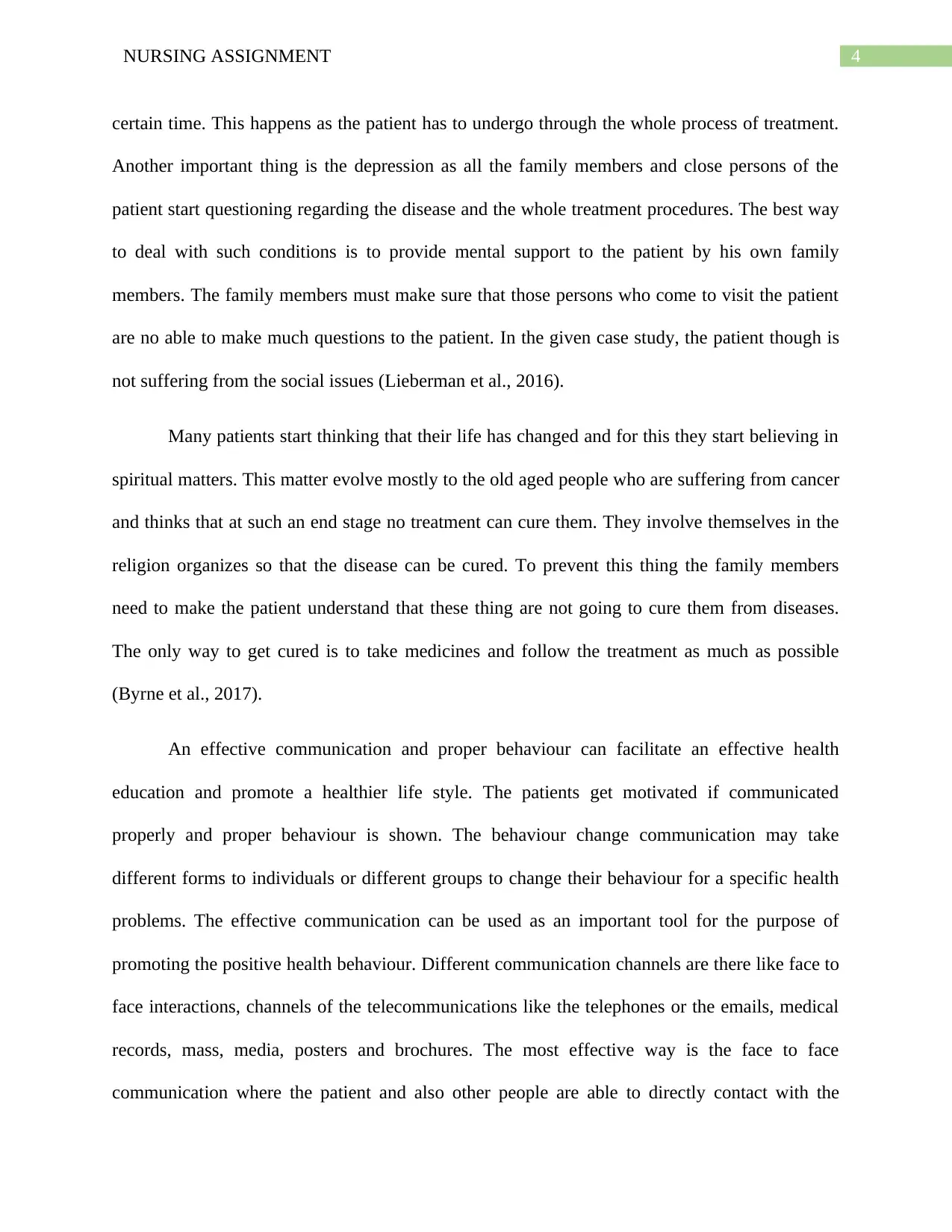
4NURSING ASSIGNMENT
certain time. This happens as the patient has to undergo through the whole process of treatment.
Another important thing is the depression as all the family members and close persons of the
patient start questioning regarding the disease and the whole treatment procedures. The best way
to deal with such conditions is to provide mental support to the patient by his own family
members. The family members must make sure that those persons who come to visit the patient
are no able to make much questions to the patient. In the given case study, the patient though is
not suffering from the social issues (Lieberman et al., 2016).
Many patients start thinking that their life has changed and for this they start believing in
spiritual matters. This matter evolve mostly to the old aged people who are suffering from cancer
and thinks that at such an end stage no treatment can cure them. They involve themselves in the
religion organizes so that the disease can be cured. To prevent this thing the family members
need to make the patient understand that these thing are not going to cure them from diseases.
The only way to get cured is to take medicines and follow the treatment as much as possible
(Byrne et al., 2017).
An effective communication and proper behaviour can facilitate an effective health
education and promote a healthier life style. The patients get motivated if communicated
properly and proper behaviour is shown. The behaviour change communication may take
different forms to individuals or different groups to change their behaviour for a specific health
problems. The effective communication can be used as an important tool for the purpose of
promoting the positive health behaviour. Different communication channels are there like face to
face interactions, channels of the telecommunications like the telephones or the emails, medical
records, mass, media, posters and brochures. The most effective way is the face to face
communication where the patient and also other people are able to directly contact with the
certain time. This happens as the patient has to undergo through the whole process of treatment.
Another important thing is the depression as all the family members and close persons of the
patient start questioning regarding the disease and the whole treatment procedures. The best way
to deal with such conditions is to provide mental support to the patient by his own family
members. The family members must make sure that those persons who come to visit the patient
are no able to make much questions to the patient. In the given case study, the patient though is
not suffering from the social issues (Lieberman et al., 2016).
Many patients start thinking that their life has changed and for this they start believing in
spiritual matters. This matter evolve mostly to the old aged people who are suffering from cancer
and thinks that at such an end stage no treatment can cure them. They involve themselves in the
religion organizes so that the disease can be cured. To prevent this thing the family members
need to make the patient understand that these thing are not going to cure them from diseases.
The only way to get cured is to take medicines and follow the treatment as much as possible
(Byrne et al., 2017).
An effective communication and proper behaviour can facilitate an effective health
education and promote a healthier life style. The patients get motivated if communicated
properly and proper behaviour is shown. The behaviour change communication may take
different forms to individuals or different groups to change their behaviour for a specific health
problems. The effective communication can be used as an important tool for the purpose of
promoting the positive health behaviour. Different communication channels are there like face to
face interactions, channels of the telecommunications like the telephones or the emails, medical
records, mass, media, posters and brochures. The most effective way is the face to face
communication where the patient and also other people are able to directly contact with the
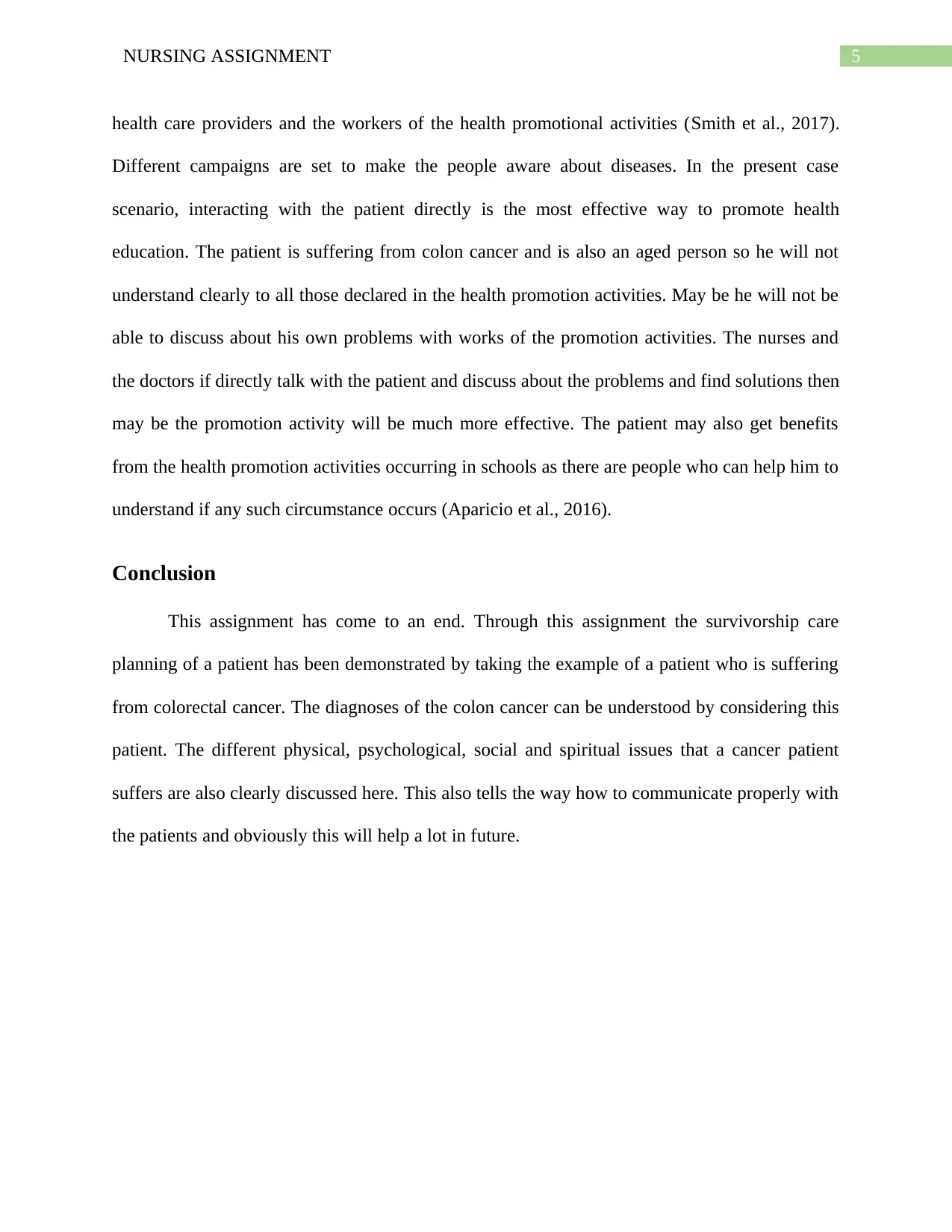
5NURSING ASSIGNMENT
health care providers and the workers of the health promotional activities (Smith et al., 2017).
Different campaigns are set to make the people aware about diseases. In the present case
scenario, interacting with the patient directly is the most effective way to promote health
education. The patient is suffering from colon cancer and is also an aged person so he will not
understand clearly to all those declared in the health promotion activities. May be he will not be
able to discuss about his own problems with works of the promotion activities. The nurses and
the doctors if directly talk with the patient and discuss about the problems and find solutions then
may be the promotion activity will be much more effective. The patient may also get benefits
from the health promotion activities occurring in schools as there are people who can help him to
understand if any such circumstance occurs (Aparicio et al., 2016).
Conclusion
This assignment has come to an end. Through this assignment the survivorship care
planning of a patient has been demonstrated by taking the example of a patient who is suffering
from colorectal cancer. The diagnoses of the colon cancer can be understood by considering this
patient. The different physical, psychological, social and spiritual issues that a cancer patient
suffers are also clearly discussed here. This also tells the way how to communicate properly with
the patients and obviously this will help a lot in future.
health care providers and the workers of the health promotional activities (Smith et al., 2017).
Different campaigns are set to make the people aware about diseases. In the present case
scenario, interacting with the patient directly is the most effective way to promote health
education. The patient is suffering from colon cancer and is also an aged person so he will not
understand clearly to all those declared in the health promotion activities. May be he will not be
able to discuss about his own problems with works of the promotion activities. The nurses and
the doctors if directly talk with the patient and discuss about the problems and find solutions then
may be the promotion activity will be much more effective. The patient may also get benefits
from the health promotion activities occurring in schools as there are people who can help him to
understand if any such circumstance occurs (Aparicio et al., 2016).
Conclusion
This assignment has come to an end. Through this assignment the survivorship care
planning of a patient has been demonstrated by taking the example of a patient who is suffering
from colorectal cancer. The diagnoses of the colon cancer can be understood by considering this
patient. The different physical, psychological, social and spiritual issues that a cancer patient
suffers are also clearly discussed here. This also tells the way how to communicate properly with
the patients and obviously this will help a lot in future.
⊘ This is a preview!⊘
Do you want full access?
Subscribe today to unlock all pages.

Trusted by 1+ million students worldwide
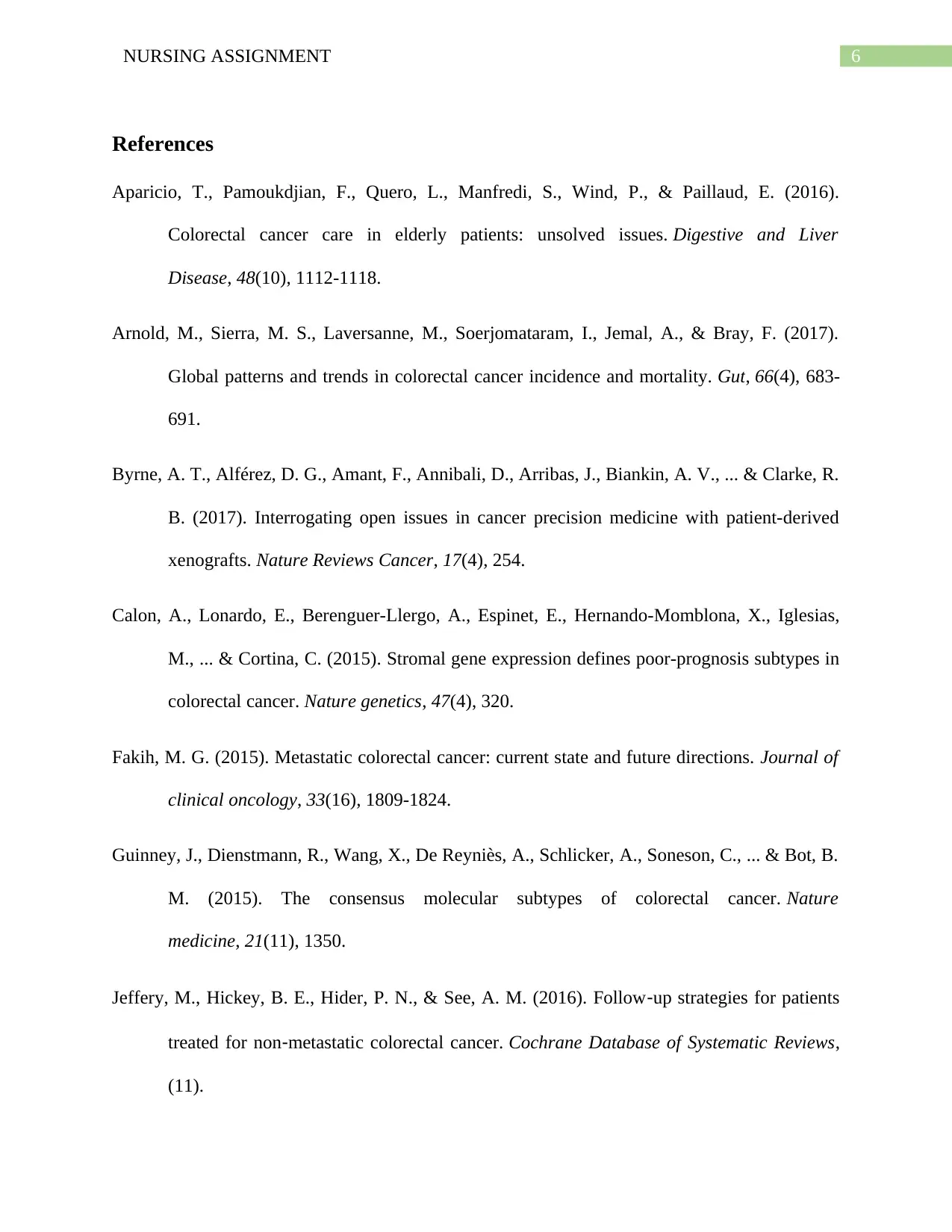
6NURSING ASSIGNMENT
References
Aparicio, T., Pamoukdjian, F., Quero, L., Manfredi, S., Wind, P., & Paillaud, E. (2016).
Colorectal cancer care in elderly patients: unsolved issues. Digestive and Liver
Disease, 48(10), 1112-1118.
Arnold, M., Sierra, M. S., Laversanne, M., Soerjomataram, I., Jemal, A., & Bray, F. (2017).
Global patterns and trends in colorectal cancer incidence and mortality. Gut, 66(4), 683-
691.
Byrne, A. T., Alférez, D. G., Amant, F., Annibali, D., Arribas, J., Biankin, A. V., ... & Clarke, R.
B. (2017). Interrogating open issues in cancer precision medicine with patient-derived
xenografts. Nature Reviews Cancer, 17(4), 254.
Calon, A., Lonardo, E., Berenguer-Llergo, A., Espinet, E., Hernando-Momblona, X., Iglesias,
M., ... & Cortina, C. (2015). Stromal gene expression defines poor-prognosis subtypes in
colorectal cancer. Nature genetics, 47(4), 320.
Fakih, M. G. (2015). Metastatic colorectal cancer: current state and future directions. Journal of
clinical oncology, 33(16), 1809-1824.
Guinney, J., Dienstmann, R., Wang, X., De Reyniès, A., Schlicker, A., Soneson, C., ... & Bot, B.
M. (2015). The consensus molecular subtypes of colorectal cancer. Nature
medicine, 21(11), 1350.
Jeffery, M., Hickey, B. E., Hider, P. N., & See, A. M. (2016). Follow‐up strategies for patients
treated for non‐metastatic colorectal cancer. Cochrane Database of Systematic Reviews,
(11).
References
Aparicio, T., Pamoukdjian, F., Quero, L., Manfredi, S., Wind, P., & Paillaud, E. (2016).
Colorectal cancer care in elderly patients: unsolved issues. Digestive and Liver
Disease, 48(10), 1112-1118.
Arnold, M., Sierra, M. S., Laversanne, M., Soerjomataram, I., Jemal, A., & Bray, F. (2017).
Global patterns and trends in colorectal cancer incidence and mortality. Gut, 66(4), 683-
691.
Byrne, A. T., Alférez, D. G., Amant, F., Annibali, D., Arribas, J., Biankin, A. V., ... & Clarke, R.
B. (2017). Interrogating open issues in cancer precision medicine with patient-derived
xenografts. Nature Reviews Cancer, 17(4), 254.
Calon, A., Lonardo, E., Berenguer-Llergo, A., Espinet, E., Hernando-Momblona, X., Iglesias,
M., ... & Cortina, C. (2015). Stromal gene expression defines poor-prognosis subtypes in
colorectal cancer. Nature genetics, 47(4), 320.
Fakih, M. G. (2015). Metastatic colorectal cancer: current state and future directions. Journal of
clinical oncology, 33(16), 1809-1824.
Guinney, J., Dienstmann, R., Wang, X., De Reyniès, A., Schlicker, A., Soneson, C., ... & Bot, B.
M. (2015). The consensus molecular subtypes of colorectal cancer. Nature
medicine, 21(11), 1350.
Jeffery, M., Hickey, B. E., Hider, P. N., & See, A. M. (2016). Follow‐up strategies for patients
treated for non‐metastatic colorectal cancer. Cochrane Database of Systematic Reviews,
(11).
Paraphrase This Document
Need a fresh take? Get an instant paraphrase of this document with our AI Paraphraser
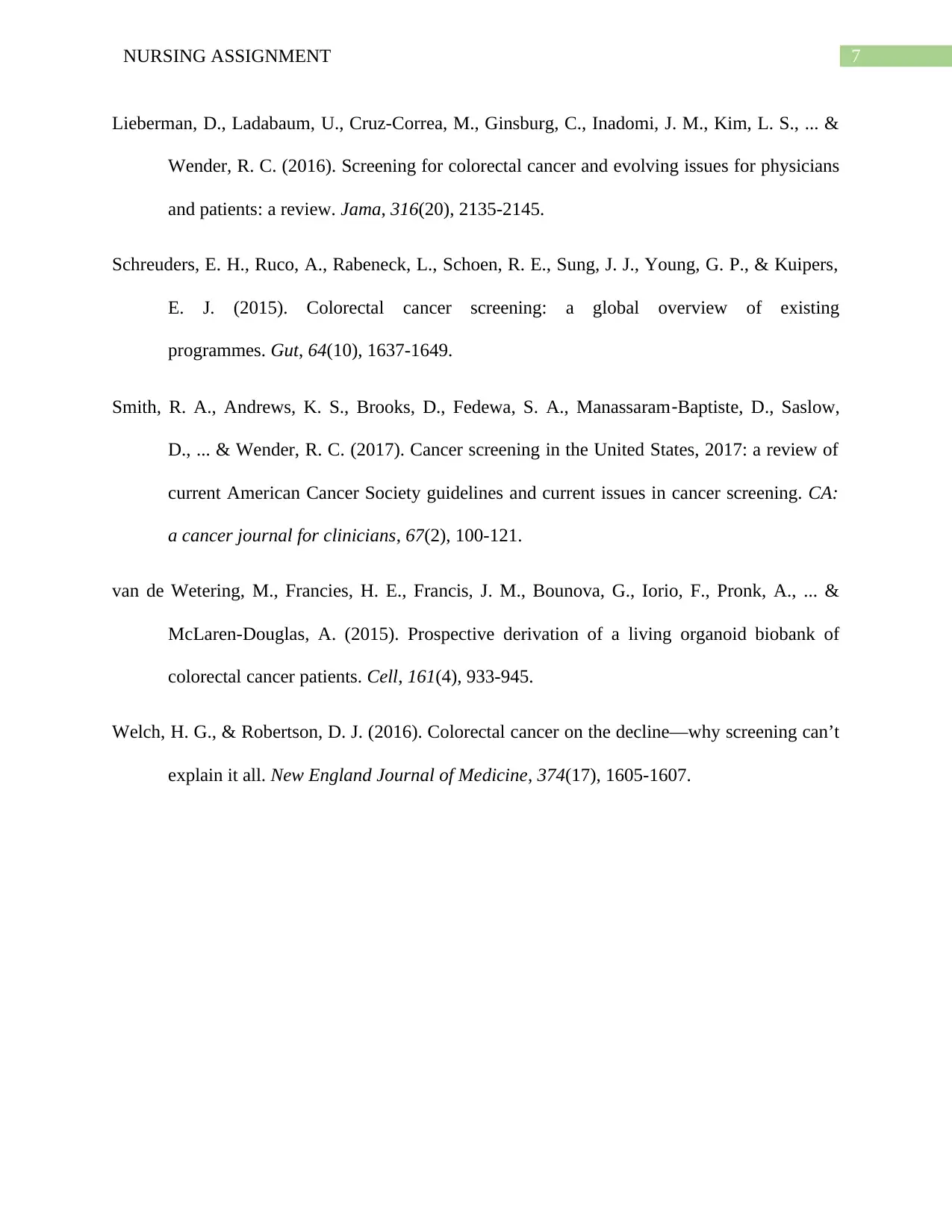
7NURSING ASSIGNMENT
Lieberman, D., Ladabaum, U., Cruz-Correa, M., Ginsburg, C., Inadomi, J. M., Kim, L. S., ... &
Wender, R. C. (2016). Screening for colorectal cancer and evolving issues for physicians
and patients: a review. Jama, 316(20), 2135-2145.
Schreuders, E. H., Ruco, A., Rabeneck, L., Schoen, R. E., Sung, J. J., Young, G. P., & Kuipers,
E. J. (2015). Colorectal cancer screening: a global overview of existing
programmes. Gut, 64(10), 1637-1649.
Smith, R. A., Andrews, K. S., Brooks, D., Fedewa, S. A., Manassaram‐Baptiste, D., Saslow,
D., ... & Wender, R. C. (2017). Cancer screening in the United States, 2017: a review of
current American Cancer Society guidelines and current issues in cancer screening. CA:
a cancer journal for clinicians, 67(2), 100-121.
van de Wetering, M., Francies, H. E., Francis, J. M., Bounova, G., Iorio, F., Pronk, A., ... &
McLaren-Douglas, A. (2015). Prospective derivation of a living organoid biobank of
colorectal cancer patients. Cell, 161(4), 933-945.
Welch, H. G., & Robertson, D. J. (2016). Colorectal cancer on the decline—why screening can’t
explain it all. New England Journal of Medicine, 374(17), 1605-1607.
Lieberman, D., Ladabaum, U., Cruz-Correa, M., Ginsburg, C., Inadomi, J. M., Kim, L. S., ... &
Wender, R. C. (2016). Screening for colorectal cancer and evolving issues for physicians
and patients: a review. Jama, 316(20), 2135-2145.
Schreuders, E. H., Ruco, A., Rabeneck, L., Schoen, R. E., Sung, J. J., Young, G. P., & Kuipers,
E. J. (2015). Colorectal cancer screening: a global overview of existing
programmes. Gut, 64(10), 1637-1649.
Smith, R. A., Andrews, K. S., Brooks, D., Fedewa, S. A., Manassaram‐Baptiste, D., Saslow,
D., ... & Wender, R. C. (2017). Cancer screening in the United States, 2017: a review of
current American Cancer Society guidelines and current issues in cancer screening. CA:
a cancer journal for clinicians, 67(2), 100-121.
van de Wetering, M., Francies, H. E., Francis, J. M., Bounova, G., Iorio, F., Pronk, A., ... &
McLaren-Douglas, A. (2015). Prospective derivation of a living organoid biobank of
colorectal cancer patients. Cell, 161(4), 933-945.
Welch, H. G., & Robertson, D. J. (2016). Colorectal cancer on the decline—why screening can’t
explain it all. New England Journal of Medicine, 374(17), 1605-1607.
1 out of 8
Related Documents
Your All-in-One AI-Powered Toolkit for Academic Success.
+13062052269
info@desklib.com
Available 24*7 on WhatsApp / Email
![[object Object]](/_next/static/media/star-bottom.7253800d.svg)
Unlock your academic potential
Copyright © 2020–2026 A2Z Services. All Rights Reserved. Developed and managed by ZUCOL.





